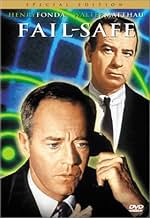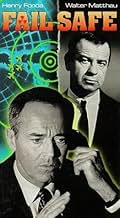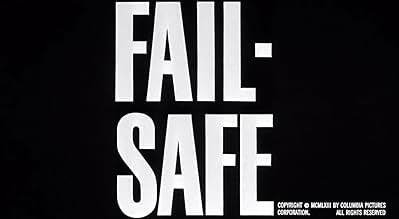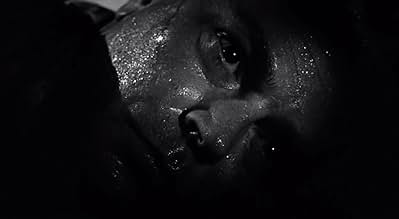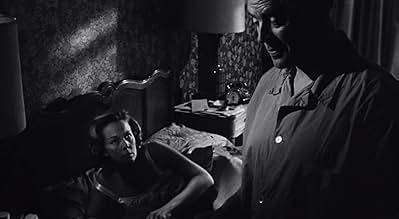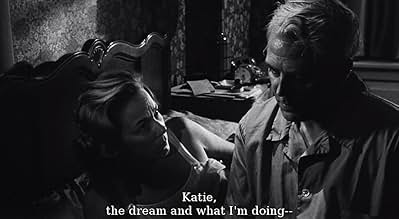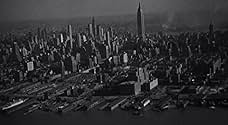VALUTAZIONE IMDb
8,0/10
26.459
LA TUA VALUTAZIONE
Un malfunzionamento tecnico invia aerei americani a Mosca per sferrare un attacco nucleare. Si può evitare una guerra totale?Un malfunzionamento tecnico invia aerei americani a Mosca per sferrare un attacco nucleare. Si può evitare una guerra totale?Un malfunzionamento tecnico invia aerei americani a Mosca per sferrare un attacco nucleare. Si può evitare una guerra totale?
- Regia
- Sceneggiatura
- Star
- Nominato ai 1 BAFTA Award
- 3 candidature totali
Dom DeLuise
- Sgt. Collins
- (as Dom DeLouise)
Recensioni in evidenza
The ultimate moral dilemma confronts the President of the United States when everything goes wrong with the strategic offensive power of a US Air Force bomber squadron, leaving viewers shaken at the end of a superior Cold war drama highlighted by its extraordinary claustrophobia.
Filming of Fail-Safe coincided with filming of Dr. Strangelove, and Stanley Kubrick succeeded in getting his film done first. The earlier publicity for Strangelove hurt Fail-Safe's exposure, and this is doubly disappointing because Fail-Safe is in most ways a superior film, telling its story straight and highlighting superior performances by the entirety of the cast, from Henry Fonda, Frank Overton, Fritz Weaver, and Dan O'Herlihy to a stunningly strong performance by comedian Dom Deluise in a rare dramatic role.
What begins as a routine albiet annoying tour for a visiting Congressman of Strategic Air Command's headquarters in Omaha turns into the ulitmate nightmare. An unidentified aircraft is spotted on a course toward Detroit and airborne bombers are scrambled to fixed points orbiting Soviet Russia until the UFO can be identified. The scramble is routine but this particular one becomes more dramatic as identifying the UFO proves more troublesome than usual, but eventually all is cleared up.
But replacement of a faulty componant in SAC's mainframe briefly flashes the base's plotting board, and activates an attack signal in Bomber Group Six under the command of old-school Colonel Jack Grady (Edward Binns). Attempt to contact Omaha runs into unexpected and mysterious jamming, and the attack signal is verified - Moscow.
It is here that the real nightmare begins, and the President himself must summon Peter Buck (Larry Hagman) down to the underground command shelter in which lies the direct "hotline" oral communication hookup to Soviet Russia's ruling chairman himself. From here the President must coordinate with the Pentagon and SAC HQ to try and stop the bombers, despite endless jamming and the crew's own orders not to answer further contacts.
The actions to stop the bombers drive the drama and bring out the excellence of the cast. Frank Overton is the SAC commanding general whose faith in his systems is shaken by the accident. Fritz Weaver is his XO, driven by shame over his upbringing (shown when he gets into a fight with his alcoholic father before being summoned to SAC HQ) and more likely to crack under the strain. Dan O'Herlihy is a Brigadier General harboring endless doubt about the sagacity of the US strategic arsenal - "We've got to stop war, not limit it," he says, against the better judgement of his peers - who plays a pivotal role in the crisis' outcome.
But even with the excellence of these and others, it is Henry Fonda as the President and Larry Hagman who drive the drama in their hotline conversations with the Soviet chairman; the pivotal angle of these conversations is Peter Buck's whispered comments about the intangibles of the Russian leader's words and expression of them - when the Soviet claims no knowledge of jamming equipment, Buck expresses belief that the Russian is lying - and also his analysis of arguments among the Russian leader's own staff; as the conversations continue on Buck takes on more and more of the role of outright surrogate for the Soviet chairman.
The running battle to stop the bombers leaves the President with a decision that is the only hope, should the bombers succeed, to prevent Russia from a full-scale retaliatory attack that will incinerate the world; the President's decision is of course outrageously implausible in real life but nonetheless works in the context of the film, and leads to a delicious bit of irony at the very end that ties in a bizarre fixation with a matador.
Among the liberties the film takes to tell the story, aside from the hotline telephone (the actual hotline was a teletype transmitter, continuously updgraded over the years), are the types of bombers used and the speed and weapon capability of these craft. Such focus on hardware often hurts dramatic pull, but here it is kept to a minimum and only serves to help move the story along, a nice balance that exemplifies the strength of the story and the performances within.
Filming of Fail-Safe coincided with filming of Dr. Strangelove, and Stanley Kubrick succeeded in getting his film done first. The earlier publicity for Strangelove hurt Fail-Safe's exposure, and this is doubly disappointing because Fail-Safe is in most ways a superior film, telling its story straight and highlighting superior performances by the entirety of the cast, from Henry Fonda, Frank Overton, Fritz Weaver, and Dan O'Herlihy to a stunningly strong performance by comedian Dom Deluise in a rare dramatic role.
What begins as a routine albiet annoying tour for a visiting Congressman of Strategic Air Command's headquarters in Omaha turns into the ulitmate nightmare. An unidentified aircraft is spotted on a course toward Detroit and airborne bombers are scrambled to fixed points orbiting Soviet Russia until the UFO can be identified. The scramble is routine but this particular one becomes more dramatic as identifying the UFO proves more troublesome than usual, but eventually all is cleared up.
But replacement of a faulty componant in SAC's mainframe briefly flashes the base's plotting board, and activates an attack signal in Bomber Group Six under the command of old-school Colonel Jack Grady (Edward Binns). Attempt to contact Omaha runs into unexpected and mysterious jamming, and the attack signal is verified - Moscow.
It is here that the real nightmare begins, and the President himself must summon Peter Buck (Larry Hagman) down to the underground command shelter in which lies the direct "hotline" oral communication hookup to Soviet Russia's ruling chairman himself. From here the President must coordinate with the Pentagon and SAC HQ to try and stop the bombers, despite endless jamming and the crew's own orders not to answer further contacts.
The actions to stop the bombers drive the drama and bring out the excellence of the cast. Frank Overton is the SAC commanding general whose faith in his systems is shaken by the accident. Fritz Weaver is his XO, driven by shame over his upbringing (shown when he gets into a fight with his alcoholic father before being summoned to SAC HQ) and more likely to crack under the strain. Dan O'Herlihy is a Brigadier General harboring endless doubt about the sagacity of the US strategic arsenal - "We've got to stop war, not limit it," he says, against the better judgement of his peers - who plays a pivotal role in the crisis' outcome.
But even with the excellence of these and others, it is Henry Fonda as the President and Larry Hagman who drive the drama in their hotline conversations with the Soviet chairman; the pivotal angle of these conversations is Peter Buck's whispered comments about the intangibles of the Russian leader's words and expression of them - when the Soviet claims no knowledge of jamming equipment, Buck expresses belief that the Russian is lying - and also his analysis of arguments among the Russian leader's own staff; as the conversations continue on Buck takes on more and more of the role of outright surrogate for the Soviet chairman.
The running battle to stop the bombers leaves the President with a decision that is the only hope, should the bombers succeed, to prevent Russia from a full-scale retaliatory attack that will incinerate the world; the President's decision is of course outrageously implausible in real life but nonetheless works in the context of the film, and leads to a delicious bit of irony at the very end that ties in a bizarre fixation with a matador.
Among the liberties the film takes to tell the story, aside from the hotline telephone (the actual hotline was a teletype transmitter, continuously updgraded over the years), are the types of bombers used and the speed and weapon capability of these craft. Such focus on hardware often hurts dramatic pull, but here it is kept to a minimum and only serves to help move the story along, a nice balance that exemplifies the strength of the story and the performances within.
Interesting that both Failsafe and Dr. Strangelove both came out in 1964 the year that Barry Goldwater and his candidacy brought up the nuclear issue. After seeing both those films together with the flip comments Goldwater made about nuclear war, he was never to be anything other than a Senator from Arizona.
Everyone remembers Stanley Kubrick's black comedy Dr. Strangelove about a nuclear exchange. Failsafe which is as serious as a crutch is less remembered. Still viewed today it still has an important message, maybe more important now than when it was a bi-polar world. At least everyone then seemed to be on one side or the other.
My favorite performer in this film is Frank Overton who worked mostly in television. On the big screen he's probably best known as the small town sheriff in To Kill A Mockingbird. Though he did a lot of television work until he died in 1967, Failsafe turned out to be his last big screen performance. Overton does a great job as the general in charge of the Strategic Air Command in Omaha who is very reluctantly trying to help the Russians shoot down SAC bombers who've had one squad of them accidentally given the go ahead for nuclear war.
Henry Fonda is the beleaguered president of the United States who is issuing commands from a deep underground bunker beneath the White House with only Russian interpreter Larry Hagman there. The whole claustrophobic atmosphere adds to the desperation of Fonda's performance. By the way note the large closeups of Fonda as he's trying to order the SAC bombers back from their mission.
You might also note in a tiny role at the SAC command center Dom DeLuise in a very serious role as a sergeant. This may be the only time DeLuise ever had a serious part.
At the Pentagon is Defense Department consultant Walter Matthau also in a serious role as a Herman Kahn type, looking to 'win' a nuclear exchange. He's one frightening fellow.
The world is no longer bi-polar, but the lessons of Failsafe have yet to be learned.
Everyone remembers Stanley Kubrick's black comedy Dr. Strangelove about a nuclear exchange. Failsafe which is as serious as a crutch is less remembered. Still viewed today it still has an important message, maybe more important now than when it was a bi-polar world. At least everyone then seemed to be on one side or the other.
My favorite performer in this film is Frank Overton who worked mostly in television. On the big screen he's probably best known as the small town sheriff in To Kill A Mockingbird. Though he did a lot of television work until he died in 1967, Failsafe turned out to be his last big screen performance. Overton does a great job as the general in charge of the Strategic Air Command in Omaha who is very reluctantly trying to help the Russians shoot down SAC bombers who've had one squad of them accidentally given the go ahead for nuclear war.
Henry Fonda is the beleaguered president of the United States who is issuing commands from a deep underground bunker beneath the White House with only Russian interpreter Larry Hagman there. The whole claustrophobic atmosphere adds to the desperation of Fonda's performance. By the way note the large closeups of Fonda as he's trying to order the SAC bombers back from their mission.
You might also note in a tiny role at the SAC command center Dom DeLuise in a very serious role as a sergeant. This may be the only time DeLuise ever had a serious part.
At the Pentagon is Defense Department consultant Walter Matthau also in a serious role as a Herman Kahn type, looking to 'win' a nuclear exchange. He's one frightening fellow.
The world is no longer bi-polar, but the lessons of Failsafe have yet to be learned.
I mentioned in another comment about a series of movies made during the mid-1960's, that I call 'political noir'.
These films are easy to spot, in that there were made in B&W, dealt with a American institutional crisis and seemed to always feature Henry Fonda somewhere in the cast.
On all three counts, this film fits that criteria.
Because this film came out around the time of "Dr Strangelove", it was somewhat overshadowed, and because of the nearly identical plots, there was even talk of plagiarism, even though this film was based on a novel by two Washington-based journalists with a remarkable insight of the workings of government and was directed by Sidney Lument, one of the cinema's great directors.
Also, unlike "Dr Strangelove", which seemed to receive major studio backing, money and the freedom offered by being produced in Great Britain where this satire was more appreciated, "Fail-Safe" was independently produced in New York on a limited budget, without official backing by the Defense Department, which explains all of the flaws complained of by many viewers and posters on this site.
Yet in spite of these limitations, Lument pulls off a major coup by presenting us with an authentic piece of Armeggeddon.
In a real-time view, we watch as a million-to-one technical fault 'orders' a wing of American bombers to attack Soviet Russia, and the Defense Department and the President are helpless in trying to stop it.
We are also witness to how our military operates, trying to plan military policy, and debating theory and possible results.
Such things are sensible and harmless as far as these things go, until 'the day comes' when reality displaces theory.
Walter Matthau, who is more well-known for his comic talents ("The Odd Couple", "Grumpy Old Men"), than being an accomplished dramatic actor, is shown at the height of his powers as Prof. Groteschelle; a defense policy wonk, whose obsession with defense preparedness and Marxist theory reaches the point of detachment from human emotion, as he blindly recommends that no action be taken and the bombers be allowed to complete their mission, resulting in 'final victory' over Communism.
This is in direct contradiction to General Black, a compassionate Air Force officer who is also an intellectual, who desperately urges that every means be made to stop the bombers before it is too late.
However, it turns out to be too late, at least on the American side.
We watch how technology becomes a hindrance, as much as the distrust between the two superpowers seems to be, as the President and the Soviet Premier desperately try to seek a solution to this disaster.
The tragedy about this is that someone thought they should remake this in 2000, which in a way is flattering but certainly could not come close to the original work.
But, this only proves that the subject of 'accidental war' is still a concern.
However, how can one do better than Henry Fonda ???
These films are easy to spot, in that there were made in B&W, dealt with a American institutional crisis and seemed to always feature Henry Fonda somewhere in the cast.
On all three counts, this film fits that criteria.
Because this film came out around the time of "Dr Strangelove", it was somewhat overshadowed, and because of the nearly identical plots, there was even talk of plagiarism, even though this film was based on a novel by two Washington-based journalists with a remarkable insight of the workings of government and was directed by Sidney Lument, one of the cinema's great directors.
Also, unlike "Dr Strangelove", which seemed to receive major studio backing, money and the freedom offered by being produced in Great Britain where this satire was more appreciated, "Fail-Safe" was independently produced in New York on a limited budget, without official backing by the Defense Department, which explains all of the flaws complained of by many viewers and posters on this site.
Yet in spite of these limitations, Lument pulls off a major coup by presenting us with an authentic piece of Armeggeddon.
In a real-time view, we watch as a million-to-one technical fault 'orders' a wing of American bombers to attack Soviet Russia, and the Defense Department and the President are helpless in trying to stop it.
We are also witness to how our military operates, trying to plan military policy, and debating theory and possible results.
Such things are sensible and harmless as far as these things go, until 'the day comes' when reality displaces theory.
Walter Matthau, who is more well-known for his comic talents ("The Odd Couple", "Grumpy Old Men"), than being an accomplished dramatic actor, is shown at the height of his powers as Prof. Groteschelle; a defense policy wonk, whose obsession with defense preparedness and Marxist theory reaches the point of detachment from human emotion, as he blindly recommends that no action be taken and the bombers be allowed to complete their mission, resulting in 'final victory' over Communism.
This is in direct contradiction to General Black, a compassionate Air Force officer who is also an intellectual, who desperately urges that every means be made to stop the bombers before it is too late.
However, it turns out to be too late, at least on the American side.
We watch how technology becomes a hindrance, as much as the distrust between the two superpowers seems to be, as the President and the Soviet Premier desperately try to seek a solution to this disaster.
The tragedy about this is that someone thought they should remake this in 2000, which in a way is flattering but certainly could not come close to the original work.
But, this only proves that the subject of 'accidental war' is still a concern.
However, how can one do better than Henry Fonda ???
This cold war era classic certainly made you think if it's storyline was possible. The plausibility of the solution to avert an all-out retaliatory nuclear war that the American and Soviet leaders decide on in the film is still debated but this film captures the essence of the cold war paranoia in this film directed by Sidney Lumet. This was Lumet's seventh film of his career and he was known for his dramas that were screen stage plays with 12 Angry Men, Long Days Journey Into Night and The Pawnbroker. Henry Fonda heads up an excellent cast including Walter Matthau, Fritz Weaver, Larry Hagman, Dan O'Herlihy, Ed Binns and Frank Overton. In 1958 author Peter George wrote the novel Red Alert and would go on to win an out of court settlement over the authors of Fail Safe, Eugene Burdick and Harvey Wheeler, on plagiarism charges. Interestingly the dramatic novel Red Alert would serve as the basic premise for this dramatic film and in the dark comedy Dr. Strangelove which were both released in the same year by the same studio. Good tension and drama from this script by Walter Bernstein. Weather it could or couldn't have happened as it did in this story it's still a compelling film 42 years later. I would give it an 8.5 out of 10.
See "Fail- Safe."
I couldn't sleep without the light on after I saw this fantastically fabricated film. When a machine malfunctions and signals a U.S bomber to drop atomic missiles over Moscow, the Soviet Premier and the U.S President struggle to save the world from nuclear holocaust. The last three minutes are among the most powerful I've seen in a movie.
I couldn't sleep without the light on after I saw this fantastically fabricated film. When a machine malfunctions and signals a U.S bomber to drop atomic missiles over Moscow, the Soviet Premier and the U.S President struggle to save the world from nuclear holocaust. The last three minutes are among the most powerful I've seen in a movie.
Lo sapevi?
- QuizThe "computer-generated" image on the control-room screen (including the map of the world, the planes and the explosions) was entirely drawn and animated by hand.
- BlooperThe end credits list General Black's wife as Betty, but in the film he addresses her as Katie and in a radio conversation, the President asks Black, "Are Kathryn and the kids in New York?"
- Citazioni
US Ambassador: [over the phone] I can hear the sound of explosions from the north east. The sky is very bright. All lit up.
[phone melts and high pitched whining sound starts]
- Curiosità sui crediti[FINAL CREDIT]: The producers of this film wish to stress that it is the stated position of the Department of Defense and the United States Air Force that a rigidly enforced system of safeguards and controls insure that occurrences such as those depicted in this story cannot happen
- ConnessioniFeatured in Henry Fonda: The Man and His Movies (1982)
I più visti
Accedi per valutare e creare un elenco di titoli salvati per ottenere consigli personalizzati
Dettagli
- Data di uscita
- Paese di origine
- Lingue
- Celebre anche come
- Límite de seguridad
- Luoghi delle riprese
- Westbury, Long Island, New York, Stati Uniti(Roosevelt Field: President's bunker)
- Azienda produttrice
- Vedi altri crediti dell’azienda su IMDbPro
Botteghino
- Lordo Stati Uniti e Canada
- 3.924.000 USD
- Tempo di esecuzione
- 1h 52min(112 min)
- Colore
- Proporzioni
- 1.85 : 1
Contribuisci a questa pagina
Suggerisci una modifica o aggiungi i contenuti mancanti

![Guarda Trailer [OV]](https://m.media-amazon.com/images/M/MV5BZjExYTg4YzctNGIwZC00ZWUwLWFhOWItNTJhYjRiY2UzZjk4XkEyXkFqcGdeQXRyYW5zY29kZS13b3JrZmxvdw@@._V1_QL75_UX500_CR0)
